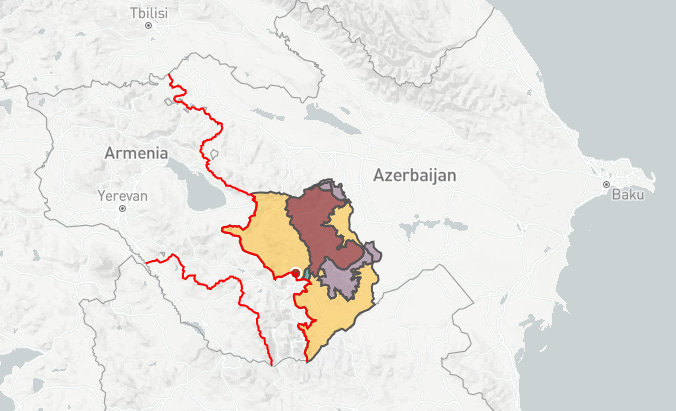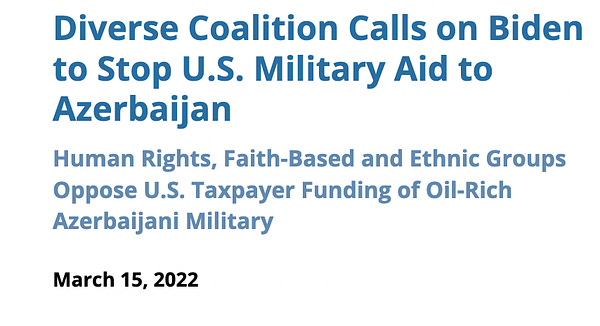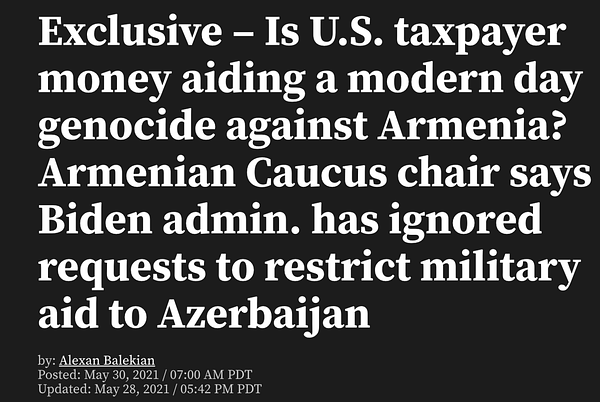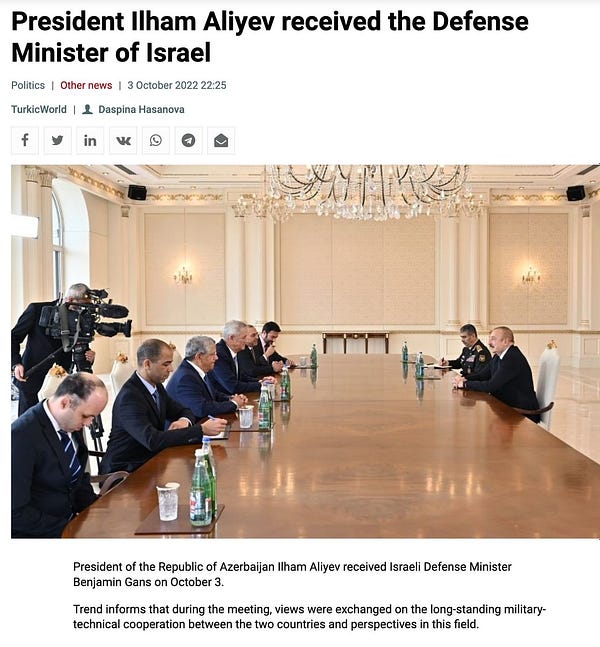Armenia Stands Alone
How the Remnant of an Ancient Kingdom Found Itself Threatened and Bereft of Allies
“Very often the people, deceived by a false image of good, desire their own ruin, and unless someone they trust can make them capable of distinguishing the good from the bad, this will bring endless danger and damage to republics.” - Machiavelli [Discourses, I.53]

I’ve been wanting to write about the simmering Nagorno-Karabakh conflict between Armenia and Azerbaijan for some time, but it has continued to flare up and calm down while other issues pull to the fore. I also had some trouble getting into the background of it and finding a take, but the take remains what I expected it would be: Western hypocrisy on this issue is absolutely stunning. This is a situation where a dictatorship is brutally attacking its weaker democratic southwestern neighbor. Every abstract principle the West goes on and on about is at stake here, but as we all know, the West only actually cares about oil and “containing” their most-hated nations such as Iran. Russia has historically protected Armenia. However, as an actual democracy, Armenians made the bad decision to elect a Western-friendly government, and now they are stuck between an offended Russia, a West who doesn’t care enough to protect them, and a brutally aggressive larger neighbor with the support of basically every powerful nation. Things do not look good for what remains of one of the world’s oldest nations.


Before beginning work on this article most of my knowledge about Armenia was from antiquity. The first great civilization to arise in what came to be Armenia was known as Urartu. This kingdom was ultimately conquered by the Median Empire. Herodotus mentions Armenia and its place within the Persian Empire at a few different points in his text. In Xenophon’s Cyropaedia Armenia is discussed in great detail as a kingdom Cyrus the Great allied with and ultimately took control of; it was under the Achamenaid [Persian] Empire that Armenia was given its current name. Armenia remained on the periphery of the “civilized” world throughout antiquity, varying in power and status- at one point Rome’s most powerful eastern neighbor, at a different time a vassal, and for a time wholly incorporated into the empire. Notably, Armenia became the first nation in the world to adopt Christianity as its official religion in 301 AD. Armenia has been there through all of recorded history, in one way or another, maintaining a coherent identity. It is truly a very, very old nation.
As with many other problems in this region, Armenia’s current troubles are what has been a “frozen” post-Soviet conflict where international borders do not reflect the ethnicities of the new ethno-states. Global powers have an extreme reluctance to recognize changes to international borders, which is a source of constant strife in the region. A recent episode of the Radio War Nerd podcast gave an excellent background of the current conflict. In short, after the fall of the Soviet Union there was a rebellion in an ethnic Armenian enclave within Azerbaijan’s internationally recognized borders, in a region known as Nagorno-Karabakh. The ethnic Armenians were successful at establishing self-rule after winning a conflict in the early ‘90s and called their Armenia-supported statelet the Republic of Artsakh. This situation remained, with great tension and animosity, until 2020 when Azerbaijan was successful in the Second Nagorno-Karabakh War. There was direct conflict between Armenia and Azerbaijan where Armenia came out worse and Artsakh forces had to withdraw from surrounding areas they had controlled since 1994. The war was a disaster for Armenia and a great success for Azeri dictator Aliyev. 2000 Russian Peacekeepers were brought in to hold the truce following the war. Though the current situation keeps flaring and then calming, Azerbaijan seems set on reclaiming all of its internationally recognized territory and is further bringing the fighting to Armenia’s borders.
Though Armenia has little to offer allies, post-Soviet Russia has tried to take up the Russian Empire’s traditional mantle as the defender of Orthodox Christianity. Armenia is a member of Russia’s Collective Security Treaty Organization [CSTO], a small military alliance made up of Russia, Armenia, Belarus, Kazakhstan, Kyrgyzstan, and Tajikistan. Since this is a mutual defense pact it means that Russia is obligated to defend Armenia’s borders, though there isn’t any way in which Armenia can actually force Russia to do so. Armenia is also one of the few foreign countries where Russia maintains a full military base. Russia supplies Armenia with all its weapons, including Iksander missiles which Armenia is the only country outside of Russia to possess, though there was a bizarre dispute about whether they worked or if they were used that almost lead to the Prime Minister being ousted. It’s worth noting that Russia has also sold Azerbaijan weapons, presumably less for geopolitical reasons and moreso simply because Russia’s arms manufacturing sector is highly profitable.
Even given Russia’s pre-occupation with Ukraine- presumably one of the things motivating Azerbaijan to act now- it would be entirely possible for Russia to intervene and protect Armenia against Azerbaijan’s 65k man military. The problem, however, is that Armenia is actually a democracy, and the public decided it should move towards a West that will never protect it. In 2018 long time Prime Minister Serzh Sargsyan was ousted in what was dubbed the “Velvet Revolution” [because it always has to be a color revolution in a former Soviet State.] The new Prime Minister, long time opposition figure Nikol Pashinyan, had a history of opposing Russia’s role in Armenia. It was said that he did this solely from expediency, as he had to oppose Russia to oppose the ruling regime, and since taking power he has been broadly loyal to Russia. However, the Kremlin has never liked or trusted him, something made much worse by the above mentioned Iksander debacle. The Kremlin doesn’t appear able to shake the feeling that Armenia could defect, and thus is not acting as a guarantor of Armenia to the extent which is necessary for this perilous moment. Geopolitically, they would be much better off ruled by an autocrat like Azerbaijan’s Aliyev. If Russia had the degree of confidence in Armenia’s fidelity that they have in someone like Belarusian dictator Lukashenko they would be much more willing to defend Armenia. Eurasianet reports that within Russia media coverage of this new round of conflict has changed, likely for the purpose of making the public feel like it is less necessary to protect their co-religionists in Armenia. A recent Russian broadcast portrayed fighting on Armenia’s border as being in Nagorno-Karabakh when in fact Armenia’s internationally recognized territory was threatened. From Eurasianet:
“But to many Armenians, the mistake appeared less a slip-up and more a deliberate attempt to mislead Russians about the nature of the recent fighting. A clip of the show went viral on social media in Armenia, where many have already been dismayed with Russia’s tepid response to the fighting.
"Russian media is spreading disinformation, which is a national security threat to Armenia,” cyber security and media expert Artur Papyan in an interview with news website 1in.am. “If not the Foreign Ministry, then at least the Radio and Television Council [a state regulatory media body] should respond to misinformation in the Russian media. […] You need to understand whose interests are being served.”
During the show’s broadcast the next day, Kuzichev formally apologized: “Of course this was about Armenia’s territory and not in some disputed territory.”
But the misrepresentation appears to be part of a pattern.”
The argument within this article is that Russian state media is downplaying the conflict so that the Russian government does not feel obliged to respond by these attacks on a treaty ally. This could be wholly due to Russia’s pre-occupation with Ukraine, but it seems most likely that it is because Armenia under Pashinyan is seen as unappreciative and unreliable, and Azerbaijan’s oil and gas is more important than any good feeling the Russian people would get from being the protectors of Orthodox Christians.
On the other side, the West is making some overtures towards helping Armenia as part of their alleged interest in liberal internationalism. Most notably, Nancy Pelosi visited the country with a small delegation including two Congresswomen of Armenian heritage; Armenia’s large diaspora is one of its main international assets. This marked the highest ranking American official to visit the country since independence. It is being alleged that the US is moving towards taking Armenia’s side but there is absolutely no reason to believe their hollow rhetoric about universal respect and liberal internationalism will ever trump Azerbaijan’s oil and gas during an energy crisis. A US security guarantee often simply means being used as a sacrificial pawn anyhow, so in their position I would be extremely cautious about any moves closer to the US given the very real and apparent risk of further alienating Russia. At the same time, it seems things are already past the point of Russia being all that much help either, so perhaps Armenia is damned regardless.
My bigger interest here is the vast hypocrisy that Azerbaijan’s aggression has not turned it into one of these “pariah states” you hear about. Granted, it is a little bit different from Russia-Ukraine in that the ethnic breakaway regions aligned with the smaller, weaker country, it’s still the case that oil rich Azerbaijan has launched a brutal war of aggression against its smaller, poorer neighbor. It should come as no surprise, however, that certain standards only apply to Europe. Foreign Policy published an uncharacteristically balanced article on this conflict titled, “Azerbaijan’s Aggression Has Forced Armenia Into Russia’s Arms,” detailing how the hostile and autocratic Azerbaijani regime has forced Armenia to remain reliant on Russian protection. They make the same point about this which I find so fascinating:
“Azerbaijan’s recent invasion of Armenia’s sovereign territory is indistinguishable in form and substance from Russia’s invasion of Ukraine. As of this week, Azerbaijan now occupies around 3.9 square miles of Armenia’s internationally recognized territory, where it controls strategic road networks and transport corridors, inhibiting freedom of movement throughout the country. Armenia’s Human Rights Defender reported that during the assault, Azerbaijan deliberately targeted civilian infrastructure and forcibly displaced thousands of civilians. Over a dozen prisoners of war have been taken captive by Azerbaijan, with horrific videos surfacing of the abuse, torture, and summary execution of Armenian captives.”
[Note: it appears that is not an error, and they have truly only captured 3.9 square miles of Armenia, of course, some borders are sacred, and that is still taking land.]
The atrocity propaganda coming out of this particular war is quite thick on both sides. I don’t want to get too deep into it, especially the more outlandish claims, but this video quite clearly shows captured men being brutally executed:

[Never fear, the Azeri’s investigated themselves and determined they did nothing wrong.]
In spite of this shocking brutality, everyone finds a reason to love Aliyev:

I first got interested in this story when the European Union’s dreadful patrician leader Ursula von der Leyen referred to Azerbaijan as a “reliable energy supplier.”

This is some serious “new frontiers in shamelessness” shit being as Azerbaijan did exactly what Russia did except they have less democracy and worse human rights. And of course, Russia never wanted to stop trade, that was wholly a decision the West inflicted on themselves. The above cited Foreign Policy article states,
“It’s hard to imagine how investing in a state like Azerbaijan—a corrupt, authoritarian regime that outcompetes Russia and Iran in the race to the bottom on human rights—projects a message of democratic solidarity, particularly when it comes at the expense of a fledgling democracy like Armenia.”
But of course, the Western leaders stand for absolutely nothing, they are just clowns managing the decline of wealth built from their ancestors’ looting and genuine productivity. Still, this is brazenly hypocritical. But it isn’t just von der Leyen praising Azerbaijan. Ankara is also a major guarantor of the Aliyev regime, boasting a close strategic alliance. This isn’t too surprising, as Ankara does not go on about human rights and Turks and Armenians have a huge amount of historical animosity, and further the Azeris are a Turkic people.
Israel has also gotten in on the Azerbaijan support, presumably from a combination of genuine economic interests as well as the idea that Azerbaijan somehow provides a hedge against Iranian influence [at no point in researching this article have I discovered any evidence that is true, but it is overwhelmingly the foreign policy conventional wisdom.] Israel is said to be Azerbaijan’s top weapons supplier:
Pelosi’s visit notwithstanding, alarmingly within the US it is only warmongers like Adam Schiff and Bob Menendez who take Armenia’s side, and these are men for whom there’s never been a phony concern about human rights that wasn’t an excuse to transfer vast wealth to the military industrial complex:





The idea that the US ever would or ever will take a pro-Armenia turn is a fantasy, and at most they would go along with keeping a status quo were Armenia is at constant risk of attacks that are usually tepidly held back.
Unfortunately for Armenia, even its own security guarantor Russia seems to prefer Azerbaijan’s wealth to Armenia’s sovereignty, and as far I can tell it is the public perception of protecting Orthodox Christians as well as Russia’s selfish desire to keep the military base and thus have forward operating power in the Caucasus which is keeping it onside at all. When Armenia formally requested aid from Russia under the auspices of Russia’s CSTO they were instead given a “fact finding mission.” Russia did dismiss Azerbaijan’s demands that she stop arming Armenia with a degree of hostility last year, but that seems to have had more to do with Russia’s lucrative arms business in general than any loyalty to Armenia. Like everyone else, Russia seems to care much, much more about the oil than Armenia. Foreign Policy reports, in the same article:
“On the eve of Russia’s invasion of Ukraine, Russian President Vladimir Putin and his Azerbaijani counterpart, Ilham Aliyev, signed an allied partnership agreement, which vowed to increase cooperation between the two countries, particularly in the sphere of energy.
In fact, the agreement came just days after Russia’s state-owned oil company Lukoil spent $1.5 billion to increase its stake in Azerbaijan’s largest gas field, bringing its ownership to 20 percent. Lukoil also holds a 10 percent stake in the South Caucasus Pipeline—as does the National Iranian Oil Company—which is a central node in the European Commission’s Southern Gas Corridor project designed to bypass Europe’s reliance on Russian energy. Azerbaijan has also used its extensive international money laundering networks to funnel millions of dollars into Russian government-linked arms exporters as well as U.S.-sanctioned Iranian companies.”
There’s a massive irony here that on top of everything else that is wrong with von der Leyen’s statement, it appears that to buy oil from Azerbaijan is still basically to buy oil from Russia. But as ever, don’t expect the Western leaders to recognize their own idiocy. Really, the only genuine friend Armenia appears to have is Greece, due to their historic ties and mutual history of victimization at the hands of the Turks. However, Greece is weak and on top of being pre-occupied with Ukraine like everyone else, is also far too occupied with the threat of a resurgent Turkiye to help their historic partners.
All in all, things are quite grim for tiny, ancient, Armenia. The truth is, being a democracy really isn’t helping them as at most its keeping them split between the Occidental and Oriental worlds; liberalism is no sort of protection in that brutal neighborhood. They’ve lost the goodwill of Russia, but can also never rely on the hypocritical geriatric dementia patients who run America to help them. Meanwhile, Europe is far too desperate for oil to care about human rights at home or abroad, and the region’s main power-player Turkiye seems to want to vindictively settle old scores. In the Radio War Nerd podcast I linked at the beginning Mark Ames said the Armenian government’s only real option is to admit how badly they miscalculated before the 2020 war and find a new strategy going forward. I agree, and unfortunately for Armenia it seems all there is to be done is get whatever peace they can from their oppressors and hope their unfortunate race can live to fight another day. It’s all very tough breaks, but the world is a cold place, and they live in a brutal region possessing no oil and no friends. Their future hopes seem to rely wholly on approaching those around them as a supplicant, and no leader wants to show humility, even when it is extremely necessary, and it is extremely necessary.
Thank you for reading! If you enjoyed this content please subscribe and share. My main content will always be free but paid subscriptions help me a huge amount [payment in Armenian Drams preferred.] I have a tip-jar on Kofi where generous supporters can donate in $5 increments. My Telegram channel is The Wayward Rabbler. You can see my shitposting on Twitter @Waywardrabbler.




Excellent work on this.
Extremely distressful conclusion. Armenia will find a way through like a sugar cane will bend but will not break!